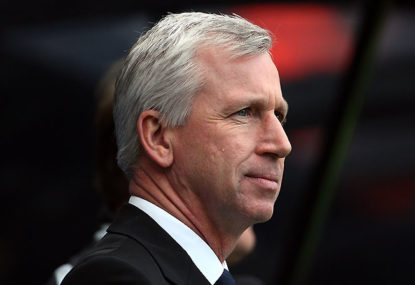WATCH: Mo Salah and Jurgen Klopp involved in heated touchline argument during West Ham draw
Salah was dropped from the starting side for the visit to London - and the striker was involved in a furious confrontation with Klopp…

On January 2, 2015, Alan Pardew was appointed Crystal Palace manager with the Eagles placed inside the relegation zone. In his first EPL game in charge, he led Palace to a surprise 2-1 win over Tottenham.
This win triggered an impressive run of results (with the notable exception of four straight league losses between mid April and early May). Palace finished tenth, 13 points clear of the relegation zone.
The so-called ‘Pardew Effect’ was taking shape at Selhurst Park.
This positive effect then flowed on for the best part of the first four and a half months of this season. A perhaps undeserved 2-1 win away on a cold, but not rainy night (yes, that joke is overused) at Stoke on December 19 last year saw Palace in sixth place and level on points with fourth-placed Spurs on 29 points.
Successive scoreless draws at Bournemouth and at home against Swansea saw Pardew’s side move up to fifth place heading into the new year. The talk of Palace playing in Europe next season was well and truly on the cards.
However, fast forward a couple of months and suddenly Palace find themselves sixth from bottom and so far have only gained two points since the start of 2016. They are winless in their past 12 league games.
The only consolation that can be taken from this period is that they are still competing in the FA Cup following three wins over fellow Premier League sides. This fade in form under Pardew-managed teams, however, is not a new phenomenon.
At his previous employers, Newcastle United, he led the Magpies to an impressive fifth-placed finish in his first full season in charge. This was their equal-highest Premier League finish since the 2003-04 season and also saw Pardew receive the Premier League Manager of the Year and League Managers Association Manager of the Year.
Suddenly, the following season saw Newcastle go from fifth place to fifth from bottom, only five points clear of the drop zone. This despite a flurry of French-based signings during the January transfer window which included capped internationals in Mathieu Debuchy, Mapou Yanga-Mbiwa and Moussa Sissoko.
The next season did see some sort of improvement, but saw a terrible run of form in 2014 and effectively cancelled out a solid run of form in late 2013. The season was also overshadowed by his infamous headbutt on Hull City midfielder David Meyler.
Calls for Pardew to leave St James’ Park were intensifying. After going winless in their first seven league matches, these calls began to echo around the stadium and even a saw website formed that was dedicated to calling for his head.
After the torrid start, the Magpies suddenly went on five-game winning run, only to be followed by a sketchy run of results until his appointment at Selhurst Park.
Prior to managerial stints at Southampton and Charlton Athletic, Pardew was in charge of West Ham from early on in the 2003-04 season to December 2006. After just missing out on promotion in his first season in charge, he led the Hammers to Premier League promotion via a 1-0 play-off final win over Preston in the following season.
West Ham’s first season back in the top flight saw them finish in a more than respectable ninth place and also saw them reach the FA Cup final. They lost on penalties to Liverpool, but only after Steven Gerrard denied them victory with a late equaliser.
However, a disastrous start to the 2006-07 season saw Pardew sacked in December despite signing the talented Argentine duo of Carlos Tevez and Javier Mascherano (albeit illegally) during the summer transfer window.
This sudden form slump might have not occurred as early on in Pardew’s stint at St James’ Park and currently at Selhurst Park, but was just as spectacular and peculiar.
On the basis of these past trends as well the current one, is it time for Pardew to go? Or should Palace back him to turn things around?